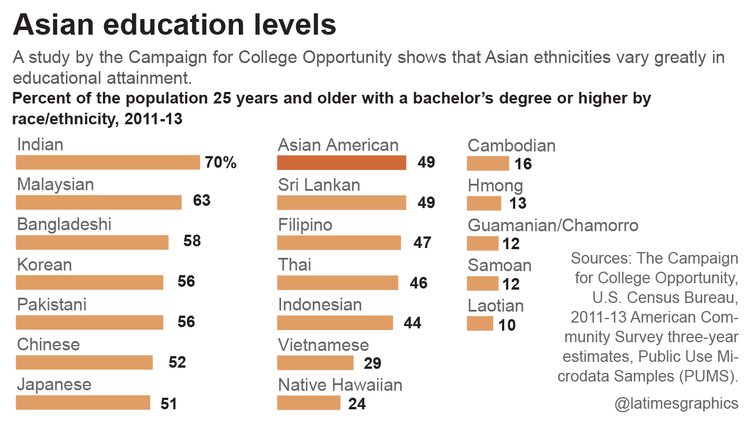"Asian" as an Overly Broad Label
Frank Shyong reports at
The Los Angeles Times:
Many of California's Hmong immigrants arrived as refugees from war and genocide and have struggled, remaining one of the poorest ethnic groups in the state. By contrast, Taiwanese immigrants typically came to California with more money and education, and they now rank among the state's most affluent groups.
About 70% of California's Indian Americans older than 25 hold bachelor's degrees, but that's true for just 10% of California's Laotian Americans. Differences like these are what motivated legislators to propose a bill that would have asked state colleges and universities and a health agency to collect more detailed data on at least a dozen specific Asian nationalities, rather than lumping them together in a single category.
AB 176 passed unanimously in the state Senate and drew just one dissenting vote in the Assembly.
Yet earlier this month, Gov. Jerry Brown vetoed it, expressing concern about "an ever growing desire to stratify."
"Dividing people into ethnic or other sub categories may yield more information, but not necessarily greater wisdom about what actions should follow," Brown wrote in his veto message. "To focus just on ethnic identity may not be enough."

But Asian leaders and activists say stratification is necessary to reflect the diversity of California's booming 5.6-million-strong Asian and Pacific Islander population, the largest of any state. They have long criticized the label "Asian" as absurdly broad, and said more nuanced data would have helped administrators and activists create programs to target struggling students. Beyond that, they saw the bill as part of a long fight against the "model-minority myth" — the assumption that all Asian Americans are affluent, well-educated, and high achieving. And Brown's veto deprived them of a tool, they said.